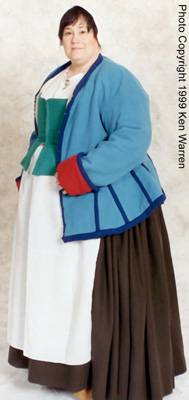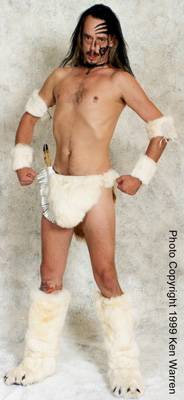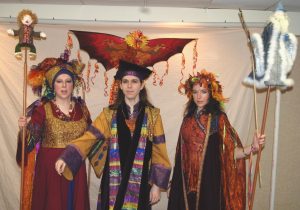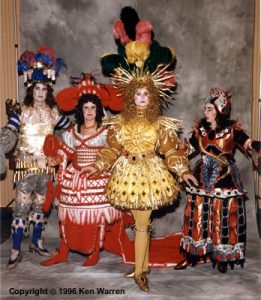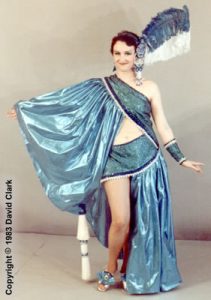CC17-H-10b: The Pleistocene Philanderer
Competition Staff & Rules
Staff:
- Director: George “Syke” Paczolt
- Master of Ceremonies: George Paczolt
- Presentation Judges: Janet Wilson Anderson, Kevin Roche, Kathy Norvell
- Judge’s Clerk: Unknown
Rules:
1. All entries in the Historical Masquerade must be based upon a reproduction of:
a. Actual historical dress, as it was worn at the time.
b. Actual theatrical or party costume that appeared in production and can be documented.
c. A documentable period costume design that never appeared on the stage (I define this as a planned costume, be it stage, fashion or whatever, that was drawn, the drawing reproduced, but the costume was never actually made – Erté immediately comes to mind).
d. A designer original, as it appeared on the runway, and presented as such.
2. Any past period costume or garment is eligible for entry, as long as it is from a period earlier than the birth date of the entrant. Exception to the age rule will be made in categories b though d (above) at the discretion of the masquerade director. (This especially refers to category d, which will be done at the director’s discretion.)
Skill Divisions
1. Young Fan. Anyone who is less than 13 years old at the time of the conference. For award purposes, this division will be subdivided into two categories – costumes made by the contestants, and costumes made for them by an adult.
2. Novice: A contestant who has won no awards in any Costume-Con Historical competition. A first entry in any costumes competition of any type, or a first entry in the historical competition no matter what skill level in another field of costuming.
3. Journeyman: A contestant who has won at least once in a Costume-Con historical competition, but less than four times. An experienced costumer (Craftsman or Master level) in another field of costuming, hut new to the historical masquerade.
4. Master: A contestant who has won more than four times in a Costume-Con historical competition, or any costuming professional who earns a significant portion of his/her income making or designing historic costumes.
5. Any contestant may voluntarily compete in a higher class that the one in which he or she qualifies. In a group costume, the class of the most skilled member will determine that entry’s class.
Categories
1. Historic Reproduction: This class is defined as an attempt to reproduce actual historic clothing in as complete a detail as is possible. Documentation will be mandatory, as the majority of the judging will be done prior to the masquerade itself. Re-enactment standards will prevail:
* Mandatory use of proper materials, or close approximations if proper materials are not available. Approximations should be documented.
* Modern machine sewing is allowed with no loss of credit. Extra credit will be given for hand sewing or documentable use of period machine techniques.
* The entrant is expected to be dressed “from the skin out” and may be expected to show said completeness at the judge’s discretion.
This category will cover both actually worn clothing of whatever period, and theatrical and performance costume that was actually made at some point in time.
2. Historical Interpretation: This class is defined as an entry that begins with an actual historical garment or garments, then intentionally departs in a visual way from the period on which it is based. Documentation, while not mandatory, is strongly suggested, if only to explain to the judges the starting point of the entry. It need not be extensive. Workmanship, complexity and creativity will be the judging criteria in this category.
3. If you’re still confused: If you can document, and duplicate what the costume looks like underneath, go Historical Reproduction. If your costume can only be documented as an outer shell, and/or you’ve started with an actual historical garment and then played with it, go Historical Interpretation.
Documentation
Take it for granted that the judges are not familiar with the costume(s) you are entering, and document accordingly. Historical Reproduction category entries will have their documentation considered an integral part of the entry and will be judged against their documentation. Historical Interpretation category entries will have their documentation used as a guide for further judging, but the documentation itself will not count as part of the costume entry. The judge’s time at the con is limited, and it would really be nice if they could have a few moments to do things other than read documentation (like eat, sleep, go to the bathroom, engage in a bit of social conversation, etc.). On the other hand, I’ve always had a problem with the concept of limiting how much documentation an entrant is allowed. After all, only you know how much documentation is needed to fully explain your entry. Considering these two disparate realities, I’ve come up with the following:
* There will be no limitation on the thickness of an entrant’s documentation. There will, however, be a limitation on the time available for the judge to be able to read it. All judges will be expected to be on site by Friday evening, and will have set time blocked out for them to read the documentation.
* For ease in reading, all documentation must be in an 8-1/2 x 11” format, hound between covers and typed. Illustrations may be on separate pages, or integrated with the text.
* Documentation will have to be sent to me prior to the conference. Details on deadline date, address, etc., will follow in the next PR. [Deadline announced in PR4 as Thursday, Feb. 4, 1999, one week prior to conference.]
* Judges will be issued the entrant’s documentation with the thinnest packets issued first, and the thickest packets issued last. Historical Reproduction documentation will be given priority.
* The judges will be expected to spend their entire time allotted in reading documentation. If the combined amount of documentation received is too much for said time, it will not be held against them if they cannot complete all the documentation.
Obviously, while you can write as much as you wish, it is in your own best interest to keep your documentation short and concise.
Prejudging
1. All Historical Reproduction Costumes will be scheduled for prejudging, the details to be worked out prior to the convention. For the moment, plan on having to go to the judges to be prejudged. If an efficient system can be worked out allowing the judges to come to your room for the prejudging, it will be done – but don’t automatically count on it. Historical Interpretation entries may waive the prejudging if they wish, but be advised, you’re probably competing at a disadvantage if you do so.
2. Entrants will he expected to show all necessary parts of the costume. The costume may either be worn in completeness for the prejudging, or, shown in pieces. If there is an item that you wish the judges to take special note of, be ready to point it out to them.
Presentation
1. Entries with up to four individuals will be limited to a maximum of 60 seconds on stage. Entries with more than four individuals will be allowed up to 90 seconds.
2. If you feel this will not be enough time to show your presentation, the masquerade director will be willing to listen to your argument and possibly allow more time. Be prepared to be VERY persuasive, however, as the masquerade director has always believed that miracles can happen and awards won in 30 seconds on stage.
George “Syke” Paczolt
Historical Masquerade Director
[Note: Workmanship Awards were defined as Construction and Detail Awards for this Costume-Con conference.]
